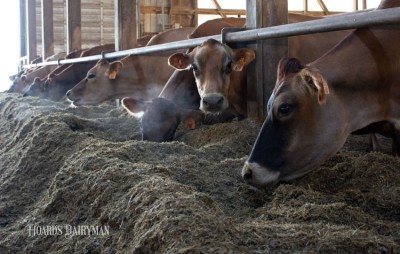Could farmers be teaching cows bad habits? by Carla Wardin

Could farmers be teaching cows bad habits?
BY CARLA WARDIN, MICHIGAN DAIRY FARMER
Although it might be entertaining to see cows running toward the feedbunk and eagerly start eating, this is also a sign that they're hungry. Unfortunately, they might be so hungry that it's a detriment.
"The reason why that can be concerning is that if cows do that too much, they're going to consume too much feed too quickly," said Trevor DeVries, professor and cattle behavior specialist at the University of Guelph. "That can then have a negative impact on the rumen environment."
"Those large meals get digested fairly quickly, particularly the highly fermentable carbohydrates," he continued during "Troubleshooting Herd Health Issues on Your Dairy-Feeding Behavior," a Cornell Cooperative Extension podcast. "As a result of that, rumen pH gets potentially depressed, and with that, fiber digestibility gets depressed. Those things can then have a negative impact on passage rate from the rumen, overall digestibility, and even influence the risk of milkfat depression, so that's potentially problematic."
Factors to consider when troubleshooting feeding behavior include:
- The size differentiation of cattle
- Group dynamics
- Stocking density
- Time needed to devote to the feedbunk - not waiting to be milked
- Small meals that encourage consistent eating patterns
- Early life management
- Continual access to feed
- Minimizing social stress and competition
Stop the sorting
Management plays a role in feedbunk behavior, as farmers don't have to just think about what feed animals consume, but also the manner in which they eat it. For instance, it's important that the total mixed ration (TMR) is well-combined so they can't completely sort it.
"Cows are pretty adept at picking through what they like," DeVries said.
He cited data from studies that showed that when calves are weaned and fed grain and hay separately, farmers don't always get the results they want.
"What we've found in some of that work is that when we feed calves that way, they tend to go to the feed bunk and consume all their grain fairly quickly, particularly if there's any competition at the feedbunk, and then pick at the forage for the remainder of the day," he said.
In their studies, they compared animal behavior in calves getting a mixed TMR and a nonmixed variation.
"We found that those calves that were fed their dietary components separately not only exhibited that slug feeding-type response when they go to the bunk and eat grain really quickly, but those animals actually became more competitive at the feedbunk," said DeVries. "Then when we switched those animals after a period of time onto a common diet, we observed that those animals actually retained those same eating behavior patterns," he said.
Humans change cattle behavior
As a result, management caused this change in animal behavior.
"So, we actually induced the learning of that slug feeding just based on how we fed those animals. Definitely, there is opportunity managing feeding early on in life to have a potential impact on the development of the carryover of these meal patterns and meal behavior patterns," he said.
Upcoming Events
WEBINAR - Automated Milking Systems Efficiency: Balancing Focus on Individual Cows and System Optimization
May 8, 2024
Please join Cornell the SWNY team and MSU Extension for our talk with Dr. Pablo Silva Boloña on improving efficiency of Automated milking systems by focusing on milking settings for individual and group success.
Broiler Field Day at Sunny Cove Farm
June 6, 2024
Alfred Station, NY
Join us for a field day to explore broiler production, processing, and finances. Meghan Snyder of Sunny Cove Farm will be our host. She raises small batches of organic broilers, processing them on-farm under the 1,000 bird exemption.
Cornell Seed Growers Field Day
July 2, 2024
Ithaca, NY
Please Save the Date for the Cornell Seed Growers Field Day to be held the morning of July 2nd. The event will be held at the NYSIP Foundation Seed Barn, 791 Dryden Rd., Rt. 366, Ithaca, NY.
Announcements
No announcements at this time.





